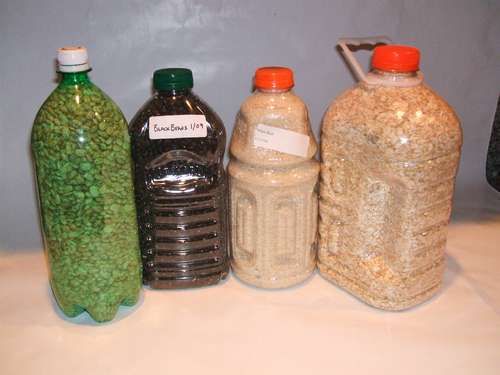Practical tips for preppers on a tight budget
By Zoey Sky // Oct 29, 2019
TAGS: budget prepper, budget prepping, coupons, financial emergency, food canning, food independence, Food Preservation, Food storage, food supply, foraging, groceries, home gardening, Homesteader, homesteading, how-to, preparedness, prepper, prepping, Recycle, repurposed items, reuse, Sales, survival, survival food, Survival Tips, sustainable living, thrift stores, yard sale

One common deterrent to prepping is the belief that it requires a lot of money. While a high income is an advantage to all preppers, you can start prepping even on a tight budget. (h/t to ModernSurvivalBlog.com)
Before deciding to purchase anything, ask yourself first, "do I need it?" or "do I want it?" It's important to make this distinction before buying items. Prioritize your needs over your wants. Here are more practical tips to help you get started on budget prepping.
Money-saving tips
- Eliminate "indulgent" expenses like alcoholic drinks, cigarettes, and drinks from coffee shops.
- Make money-saving switches. For example, instead of buying ice cream this week, buy beans and rice for your stockpile instead.
- Install a clothesline in your backyard to dry your clothing.
- Take showers instead of baths to conserve water.
- Turn off the lights and appliances when you're not using them.
- Use AM/FM radio and "antenna TV," which are free.
- Clean the furnace filter regularly so it runs efficiently.
- Learn how to cut your own hair or a family member's hair.
- Instead of buying, borrow tools from your neighbors.
- Share Wi-Fi with friends and split the monthly bill.
- Raise some cash and declutter at the same time by having a yard sale.
- Do odd jobs for people like mowing the lawn or doing their laundry.
- Reduce as many monthly bills as you can.
- Never buy anything on credit. If you use your card, pay it off each month. Settle debts immediately.
- Make positive lifestyle changes. Walk more or ride your bicycle to work to save money on gas.
Preparedness and survival skills and knowledge
- Read up on essential preparedness and survival knowledge at the local library or read articles online.
- Download free prepping books.
- Learn how to start a fire.
- Read up on wild edibles that are common in your area.
- Start a home garden. Seeds are cheap and home gardening offers an affordable way to grow fruits and vegetables right in your backyard.
- Learn about home canning and other methods of preserving your harvest.
- Learn how to make your own all-purpose cleaning and laundry soap.
Free or cheap supplies and gear
- Ask bakeries, cake shops, and grocery stores if you can have their discarded five-gallon buckets and lids.
- Save jars and lids from pickled foods, jams and jellies, and other products. Repurpose by designing and labeling as containers for odds and ends around your house.
- Save old clothes. Cut them up for rags and wash cloths.
- Reuse or repurpose items before you throw anything away.
- Check the local paper or online ads (e.g., Craigslist) for items that other people are giving away.
- Check out thrift stores for great deals on clothing and supplies. (Related: Bang for your buck: 12 Preps you can get from a discount store.)
- As much as possible, buy supplies that are on sale.
- Use coupons to save money on groceries and supplies.
- Barter and trade for supplies.
- Visit estate and yard sales for cheap and useful items.
Building your survival food stockpile
- Learn how to cook.
- Try "poor meal" recipes to save money.
- Forage for wild edibles in your area.
- Drive around and look for yards with fruit-bearing trees. Ask homeowners if you can pick some fruit.
- Grow your own garden with fruits and vegetables that you and your family like to eat.
- Preserve any surplus harvest by canning, drying, and other methods.
- Buy a couple of extra canned food whenever you're out for groceries. In time, you'll have enough for a survival stockpile.
- Don’t throw away leftovers. Find ways to use them for other meals to save on prep time.
Prepping can be affordable if you limit or cut unnecessary expenses and thrift for supplies. There are many ways to start prepping – don't let budget be a hindrance to your journey to a preparedness lifestyle.
Sources include:
Related Topics
budget prepper budget prepping coupons financial emergency food canning food independence Food Preservation Food storage food supply foraging groceries home gardening Homesteader homesteading how-to preparedness prepper prepping Recycle repurposed items reuse Sales survival survival food Survival Tips sustainable living thrift stores yard saleLatest News
05/23/2023 / By Ethan Huff
05/23/2023 / By Ethan Huff
05/23/2023 / By Kevin Hughes
Related News
10/22/2019 / By Zoey Sky
10/21/2019 / By Grace Olson
10/06/2019 / By Edsel Cook
07/29/2019 / By Melissa Smith
07/20/2019 / By Edsel Cook
Take Action:
Support NewsTarget by linking to this article from your website.
Permalink to this article:
Copy
Embed article link:
Copy
Reprinting this article:
Non-commercial use is permitted with credit to NewsTarget.com (including a clickable link).
Please contact us for more information.
Please contact us for more information.



















